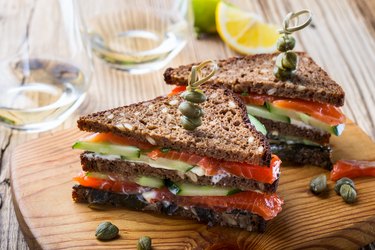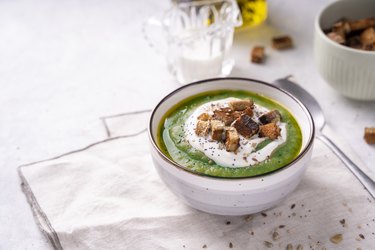It might be simple and quick to prepare, but you may be wondering how many calories are in a turkey sandwich and if there are ways to make your meal more nutritious and filling.
How you make your turkey sandwich matters. A gourmet version with toppings like bacon, cheese or mayonnaise will have more calories and fat than a turkey sandwich on whole-wheat bread with mustard, lettuce and tomato.
Turkey sandwich calories and nutrition depend on what you make your lunch with. Using toppings like cheese adds some fat, while choosing whole wheat adds more fiber, vitamins and minerals.
Turkey sandwiches are a lunchtime staple for many. They’re tasty, easy to make and can be quite nutritious. But when it comes to nutrition most people focus on the protein content of these sandwiches. After all, turkey is a lean protein that builds muscle, keeps you full, and provides key nutrients.
So how much protein is actually in your average turkey sandwich? Is it enough to keep you fueled and satisfied? Let’s take a detailed look.
Protein Needs and Recommendations
First it helps to understand how much protein you need daily. The Recommended Dietary Allowance (RDA) for protein is 0.8 grams per kilogram of body weight. So if you weigh 150 pounds, that’s about 68kg meaning your RDA is around 54g of protein per day.
Protein needs can vary based on your age, activity level, and health goals Athletes and very active people need more, around 12-2.0g per kg of body weight. Older adults also require more to preserve muscle mass.
Whatever your needs, it’s ideal to spread your protein intake throughout the day over main meals and snacks. Getting adequate protein at each meal can help regulate appetite and blood sugar.
Turkey Sandwich Protein Sources
A turkey sandwich contains protein from a few main sources:
-
Turkey – The star ingredient! 3 ounces of sliced turkey breast provides around 21g of protein.
-
Bread – Whole grain bread provides 3-5g protein per slice, white bread typically 2-3g.
-
Cheese – Cheese slices or spreads like cheddar or Swiss add 6-7g protein per ounce.
-
Veggies – Lettuce, tomatoes, etc. add small amounts of 1-2g protein.
-
Condiments – Certain condiments like hummus or peanut butter can add 2-3g per tablespoon.
So in a typical turkey sandwich, turkey contributes the bulk of the protein. But the other ingredients do add a little boost.
How Much Protein in Different Turkey Sandwiches
The protein content in turkey sandwiches can range quite a bit. A small turkey sandwich on white bread with minimal fillings might only have around 15-20g protein. But a hearty triple decker on whole grain bread with extra meat, cheese, and veggies could have 30g or more.
Here’s the approximate protein in different common turkey sandwich types:
-
Classic deli turkey on white with lettuce and tomato: 19g protein
-
Club sandwich with ham, bacon, and cheese: 26g
-
Open-faced turkey melt with avocado: 22g
-
Turkey and Swiss on whole wheat with mayo: 24g
-
Triple decker turkey club: 31g
So you can see there’s a wide spectrum when it comes to the protein packed into turkey sandwiches. In general, additional meat, cheese, and whole grain bread will boost the protein numbers.
Turkey Sandwich Protein Compared to Other Lunches
Compared to other common portable lunches, turkey sandwiches are one of the most protein-rich options out there. Here’s how they stack up:
-
Turkey sandwich: 19-31g protein
-
Peanut butter and jelly: 8-12g
-
Tuna or chicken salad sandwich: 20-25g
-
Greek yogurt with fruit: 15-20g
-
Cottage cheese and veggies: 28g
-
Salad with grilled chicken: 25-35g
-
Burrito bowl with beans, rice, chicken: 20-25g
Turkey and other meat/protein-based sandwiches tend to be some of the highest when looking at typical lunchtime choices. But you can also customize other options, like salads and bowls, to make them more protein-packed as well.
Nutrition Beyond Protein in Turkey Sandwiches
While protein might be the headline grabber, it’s important to note that turkey sandwiches can provide many other nutrients too.
Turkey is rich in niacin, vitamin B6, zinc, and selenium. Whole grains offer fiber, iron, folate, and magnesium. And veggies like lettuce, tomatoes, peppers, and avocados provide vitamins A, C, and K.
So when eating a turkey sandwich, you’re getting far more than just a protein boost. All of those additional nutrients offer health benefits and help make it a well-rounded nutritious choice.
Tips for Adding More Protein to Your Turkey Sandwich
If you want to ramp up the protein even more in your turkey sandwich, there are easy ways to do it:
-
Choose whole grain or sprouted grain bread over white bread
-
Opt for multigrain breads with added protein sources like quinoa, nuts, or seeds
-
Add extra turkey or other deli meats like chicken or roast beef
-
Include two slices of cheese instead of one
-
Spread on protein-rich condiments like hummus, nut butter, or cottage cheese
-
Pile on protein-packed vegetables like spinach, kale, broccoli, edamame, or artichokes
-
Top with 1-2 hardboiled eggs sliced or mashed into an egg salad
With a few simple additions like these, you can easily increase the protein in your turkey sandwich by 5-10g per serving or more.
Potential Drawbacks of Relying Too Heavily on Turkey Sandwiches
While turkey sandwiches can clearly provide a solid protein boost, there are a few potential drawbacks of relying on them too heavily:
-
They may get boring and monotonous if eating daily
-
Higher sodium deli meats should be consumed in moderation
-
Nutrient variety could suffer if not rotating other protein sources
-
Wheel of nutrition may be thrown off if not balanced with enough veggies, fruits, healthy fats
To avoid potential issues, keep intake of high-sodium turkey reasonable, choose whole food condiments, and pair your sandwiches with plenty of fresh produce. And incorporate other lean proteins into your diet throughout the week too, such as eggs, Greek yogurt, beans, fish, and chicken.
Sample High-Protein Turkey Sandwich Meals and Snacks
If you want to get the most protein bang for your buck from turkey sandwiches, here are some hearty sample meals and snacks to fuel your day:
Breakfast: Turkey and egg white sandwich on whole grain bread + Greek yogurt + fruit
Lunch: Triple decker club sandwich + low-fat cottage cheese + raw veggies
Dinner: Open-faced turkey melt + kale salad + quinoa
Snacks: Turkey rolls ups + hummus + apple + mixed nuts
By incorporating turkey sandwiches alongside other protein-rich foods and plenty of produce, you can easily meet your daily protein needs as part of a varied, well-balanced diet.
The Takeaway on Turkey Sandwich Protein
So how much protein is in a turkey sandwich? In short, a typical one will provide around 19-31g protein depending on size and ingredients. This makes it one of the most protein-packed on-the-go lunch options.
Turkey sandwiches can be an easy and nutritious option as part of a healthy diet. Just be mindful of overdoing high-sodium deli meats, balance with plenty of other whole foods, and rotate in different lean proteins too. With some small tweaks, turkey sandwiches can be an excellent and satisfying protein source any time of day.
/turkey_annotated-b66cb3d317d44f35be63a0e5b1117f5b.jpg)
Turkey Sandwich Calories and Nutrition
According to the USDA, a turkey sandwich with American cheese, tomato and lettuce on an Italian sub roll will give you:



- Calories: 360
- Total fat: 11 g
- Saturated fat: 6 g
- Trans fat: 0 g
- Cholesterol: 49.9 mg
- Sodium: 1,279.2 mg
- Total carbs: 35 g
- Dietary fiber: 1 g
- Sugar: 2 g
- Protein: 29 g
Turkey Sandwich Calories and Macros
- Calories: Youll get about 360 calories in a turkey sandwich.
- Total fat: A turkey sandwich has 11 grams of total fat, which includes 6 grams of saturated fat and 0 grams of trans fat.
- Carbohydrates: A turkey sandwich has 35 grams of carbs, which includes 1 gram of fiber and 2 grams of sugars.
- Protein: A turkey sandwich has 29 grams of protein.
High Protein Turkey Sandwich 28 grams of protein
FAQ
Is a turkey sandwich a good source of protein?
How much protein is in a deli turkey sandwich?
|
Nutrient
|
Value
|
|
Fiber
|
5g
|
|
Sugar
|
5g
|
|
Protein
|
54g
|
|
Calcium
|
250mg
|
How much protein is in a turkey sandwich with mayo?
How much protein does 2 slices of deli turkey have?
How many calories are in a turkey sandwich?
There are 308 calories in 1 Turkey Sandwich. Calorie breakdown: 27% fat, 36% carbs, 38% protein. There are 308 calories in 1 Turkey Sandwich. Get full nutrition facts and other common serving sizes of Turkey Sandwich including 1 oz and 100 g.
How much protein is in a slice of Turkey Breast deli meat?
A single slice (1 oz) of Turkey Breast Deli Meat has 29 calories and includes 1.2 grams of total carbohydrates, 1.1 grams of net carbs, 0.5 grams of fat,4.8 grams of protein, and 1.2 grams of protein. How much protein is in a slice of Deli Turkey?
How many carbs are in a turkey sandwich with spread?
Total carbs in a 1 Turkey Sandwich with Spread is 26.36 (g), 9% of daily value. Sugar in a 1 Turkey Sandwich with Spread is about 2.26 g and the amount of protein in a 1 Turkey Sandwich with Spread is approximately 28.74 g.
How much fiber is in a turkey sandwich?
Breakfast: whole-grain bran flake cereal (5 grams of fiber), half a banana (1.5 grams of fiber), and skim milk. Snack: 24 almonds (3.3 grams of fiber) and a quarter cup of raisins (1.5 grams of fiber) Lunch: Turkey sandwich made with 2 slices of whole wheat bread, lettuce, and tomato (5 grams of fiber), and an orange (3.1 grams of fiber)
